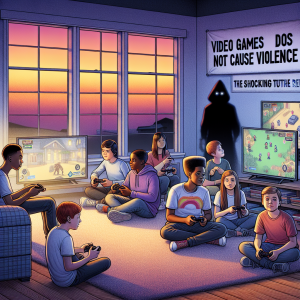Video games do not cause violence: Understanding the facts behind the misconception
Video games do not cause violence — a statement backed by extensive research and expert analysis, yet one that remains debated in public discourse. For years, video games have been unfairly blamed as a direct contributor to aggressive behavior and real-life violence. However, when we look closely at the evidence, it becomes clear that this connection is far more complex and less direct than many assume. Understanding the true relationship between video games and violence requires examining scientific studies, societal influences, and the psychology behind human behavior.
The origin of the misconception

The idea that video games cause violence often stems from incidents involving young perpetrators who happened to be gamers. High-profile violent events, such as school shootings, have led to scrutiny of video gaming as a potential contributing factor. Media coverage in these instances tends to highlight the shooter’s video game habits, creating a public association between gaming and violent actions.
However, correlation does not equal causation. Millions of people worldwide play video games regularly without engaging in violent acts. This discrepancy indicates that other factors, such as mental health, social environment, and personal circumstances, play much more significant roles in influencing violent behavior than video games alone.
Scientific research: What does it say?

Multiple studies and meta-analyses have explored whether violent video games cause increased aggression or violent behavior. The consensus in the psychological and criminological communities suggests that there is no clear causal link.
For example, a comprehensive review conducted by the American Psychological Association found only a small increase in short-term aggressive thoughts or feelings, which do not translate into real-world violence. Additionally, studies following individuals over extended periods have not demonstrated that violent video games increase the likelihood of engaging in harmful actions against others.
In fact, some research even points to positive outcomes from gaming, such as improved cognitive skills, problem-solving abilities, and social connections in multiplayer settings. These benefits highlight how video games can be a source of entertainment and personal growth rather than a catalyst for violence.
The role of social and environmental factors
It is crucial to consider the context in which individuals develop violent tendencies. Factors such as poverty, family instability, exposure to domestic violence, mental illness, and access to weapons significantly impact the likelihood of violent behavior. These elements often receive less attention but are far more predictive of violence than video game use.
Furthermore, the stereotype of gamers as socially isolated or emotionally unstable does not hold universally true. Gaming communities often provide support networks and social interaction, which can promote positive mental health. Blaming video games oversimplifies the issue and shifts focus away from addressing underlying societal problems effectively.
How video games differ from other media
Another important consideration is how video games compare to other forms of media traditionally associated with violence, such as movies and television. Violent content has existed in many entertainment formats for decades, yet there has been no corresponding epidemic of violence attributable to them.
Video games are interactive, which some argue might have a stronger psychological effect. However, interactivity alone does not inherently promote violent behavior. Most gamers engage in role-playing, problem-solving, and collaborative activities that require strategic thinking and cooperation. These experiences differ sharply from passive consumption of violent imagery and often foster empathy and teamwork.
Promoting media literacy and healthy gaming habits
Rather than demonizing video games, it is more productive to promote media literacy and responsible consumption. Parents, educators, and policymakers can educate young people on distinguishing between fantasy and reality in video games. Setting appropriate boundaries on gaming time, encouraging diverse activities, and fostering open communication about content help ensure that gaming remains a healthy and positive pastime.
Game developers are also increasingly aware of the societal concerns surrounding violent content. Many offer varied genres catering to different audiences, including educational and non-violent games that stimulate creativity and learning.
Conclusion
Video games do not cause violence. The evidence points to a complex interplay of factors influencing human behavior, with video games playing a minimal role, if any, in triggering violent acts. Embracing this understanding allows society to focus on addressing the real causes of violence and appreciating video games for the engaging and enriching experiences they can offer. By fostering informed and balanced perspectives, we can move beyond outdated stigmas and recognize video games as a legitimate and valuable part of modern culture.


